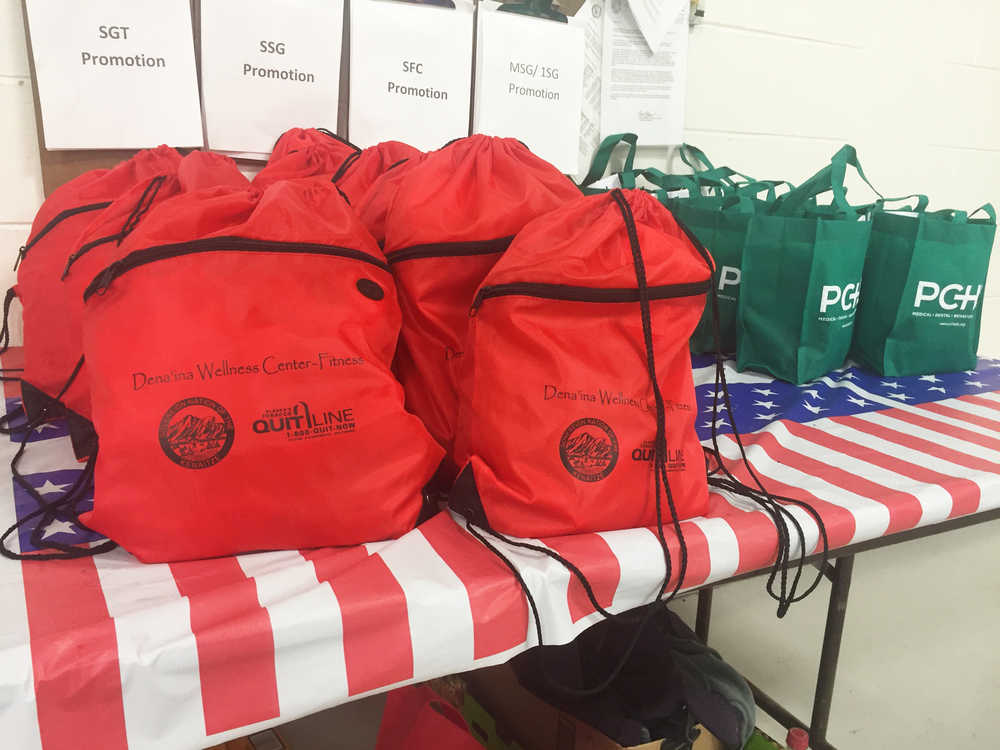Though it may not be overly visible or accurately recorded, homelessness on the Kenai Peninsula is a pervasive issue.
Kenai Peninsula Journey Home, an organization dedicated to addressing homelessness on the Kenai Peninsula, held two workshops last week at the Alaska Army National Guard Armory in Kenai for resource providers and members of the public to brainstorm ideas for how best to address the community issue.
“We all work in behavioral health and we have clients that just didn’t get better because they’re living in the woods, and they cycle in and out of corrections,” said Margene Andrus, one of the group’s members. “And we just felt like we really had to do something about it.”
Wednesday’s workshop focused largely on how resource providers and organizations can network to better help the homeless community. This included conversation about the difficulties of recording the number of homeless people in the area and barriers to getting funding. More members of the public attended Thursday’s meeting, including some who have experienced homelessness themselves.
Joy Conner is one of those participants. For the last two years, she has put together and handed out “blessing bags” to homeless individuals and families both on the peninsula and around the state. They include things like hygiene products and other basics.
Conner knows where several homeless camps on the central peninsula are and brings her bags, as well as soup during the colder months, to the homeless populations there.
“There’s a huge need, even here locally,” she said. “I was really surprised.”
Inspiration for the blessing bags came from her own experiences living without a home, Conner said.
“There was a time … I found myself either in the shelter or there was a time I was living in a truck and I was pregnant, and I was kind of in dire straights,” she said. “So I reflected back on my life there about two years ago and I thought, ‘What would I have really found helpful?’”
Much of Thursday’s conversation focused more on the stigma homeless people face on a daily basis.
“They’re treated very unkindly and very poorly in this community, and so they aren’t always out in the open,” Conner said. “They’re hidden, they’re in the camps, they’re in the trees. They’re in the trenches, really — literally.”
Some workshop participants who have been homeless said the very agencies and groups that offer resources can unintentionally create barriers to homeless people getting help if they unknowingly perpetuate stereotypes. Those feelings of being judged or misunderstood can prevent homeless people from accepting the help they are offered, they said.
One of the reasons it can be hard to track the peninsula’s homeless population is that many aren’t recorded anywhere until they come to an agency and ask for help, said Carolyn Henning, who works in behavioral health.
Some stereotypes addressed at the workshop were that homeless people are dangerous, addicts, lazy or living with mental health issues. The reality, attendees said, is that many are individuals or families who are victims of situations beyond their control, like losing a job, experiencing an expensive medical emergency or losing a spouse and source of income.
“I would say it’s the situation that defines who’s homeless,” Henning said while working in a small group.
Conner said she once met a family camping outside after they could no longer afford their rent and other bills. Both parents were still working full time, she said.
“The husband was actually trying to encourage the wife to just go to (the) LeeShore (Center) and tell them that he was beating her,” Conner said. “And she’s like, ‘I could never do that, I’m not doing that,’ but that is unfortunately the position that a lot of the people are pushed into, because what else are they going to do?”
The lack of a shelter just for people without a home on the peninsula was an issue brought up several times at the workshop. The LeeShore Center welcomes women and children who experience domestic abuse, the Friendship Mission offers Christian-based services for men, and several transitional homes are in the works for those suffering addictions, but there is no shelter in the area specifically for the homeless, no matter their situation. One attendee suggested taking advantage of the many abandoned buildings on the central peninsula in order to make opening a shelter more feasible and affordable.
Some workshop participants who have experienced homelessness described the homeless community as tight-knit, protective of each other and almost part of a different culture altogether.
One participant suggested encouraging model members within in the homeless community to better represent and translate needs to the organizations offering help.
Andrus said a major goal of the workshops was to pick up ideas of where to go next.
“We don’t really have an agenda other than finding out what the community will support,” she said.
She, Conner and others addressed the need for area agencies and organizations that offer help for the homeless to join forces.
“I’m really hoping that there’s more of an awareness with the different resources, as we gather here, that we can be aware of each other and maybe not be so — I find that there’s a lot of competition between the different resources and agencies …,” Conner said. “Let’s pull together and, you know, resolve and solve the problem instead of just, ‘let’s just talk about it and know that there is one.’ What are we going to do to make a difference?”
Reach Megan Pacer at megan.pacer@peninsulaclarion.com.

